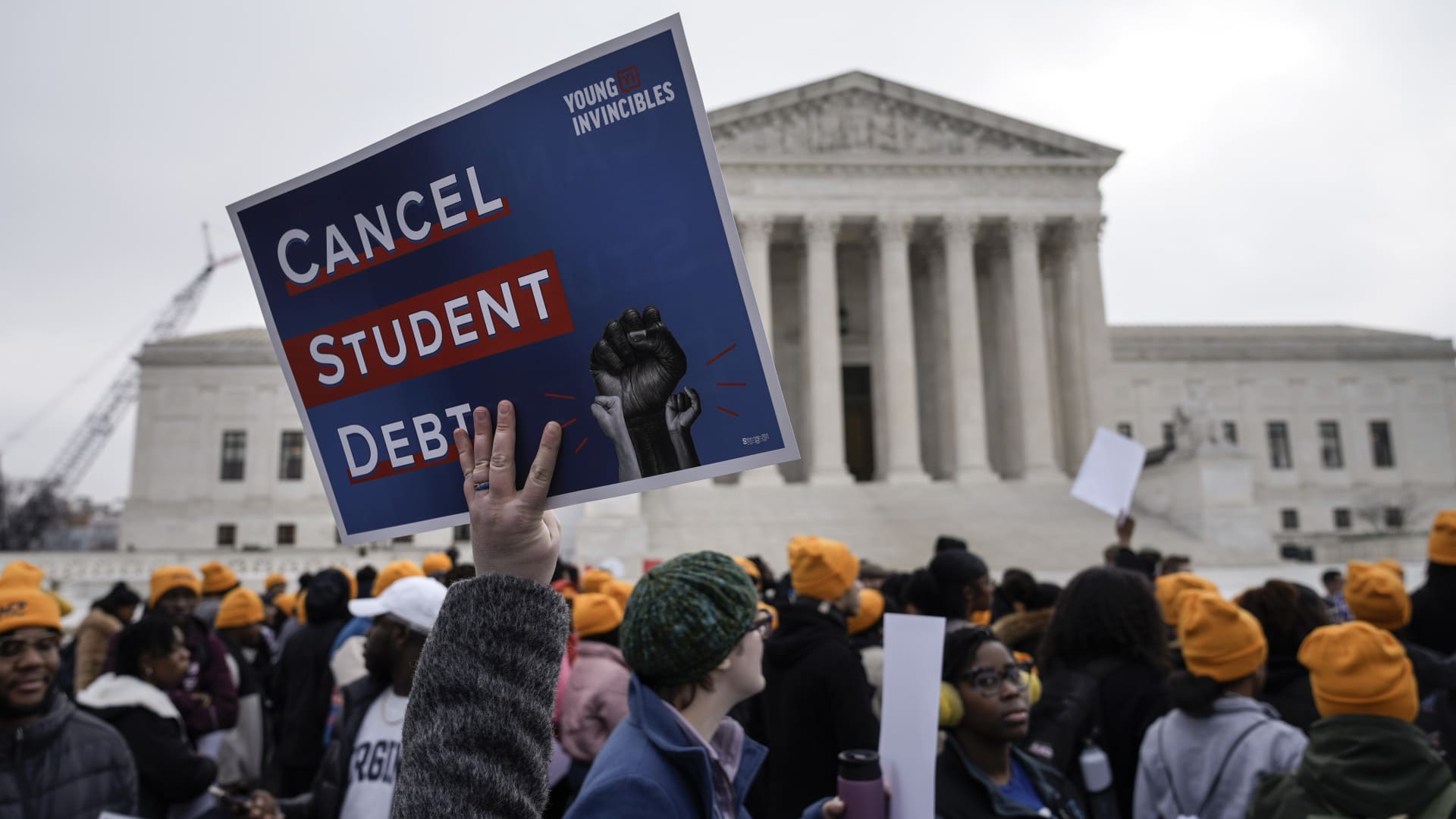The Supreme Court began hearing arguments Tuesday morning in the first of two cases challenging the Biden administration’s plan to forgive an estimated $400 billion or more in federal student loan debt for tens of millions of Americans.
President Joe Biden unveiled the plan, which would wipe out up to $20,000 in loans for certain borrowers, last year.
Early in the hearing, Chief Justice John Roberts questioned Solicitor General Elizabeth Prelogar, who is defending the program, about the argument by the plaintiffs that Congress needed to approve the debt relief first before it was set in motion. That did not happen in this case.
“Do you think Congress shouldn’t be surprised when half a trillion dollars gets wiped off the books?” asked Roberts, who is part of the court’s conservative supermajority.
“I think most casual observers would say if you’re going to give up that amount of money … then Congress should” have to approve that, Roberts later said.
A liberal justice, Sonia Sotomayor, echoed that, asking Prelogar how she would deal with “the amount at issue,” which plaintiffs argue triggers the so-called major questions doctrine. Under that doctrine, the Supreme Court has said previously said that Congress must approve a federal agency’s action on an issue of major national significance.
Prelogar answered that the amount of money at stake “can’t be the sole measure triggering the major questions doctrine.”
“National policies these days frequently involve substantial cost or trigger political controversy,” she added.
Prelogar argued that the debt relief is allowed under the Heroes Act, which allows the secretary of Education to alleviate the hardship that federal student loan recipients could suffer due to national emergencies.
The Biden administration used the public health emergency from the Covid pandemic as the basis for the program.
Nebraska Solicitor General Jim Cambell, who argued on behalf of Republican attorneys general for six states challenging the plan, told the justices that “never before has the Heroes Act been used to forgive a single loan.”
Campbell said that Education Secretary Miguel Cardona’s use of the act for the purpose of alleviating student loan debt was “breathtaking.”
“He needs clear congressional authorization for such power, which he doesn’t have because the Heroes Act does not authorize this program,” Campbell said. “This court should declare this program unlawful.”
“It is the creation of a brand new program that Congress never intended,” he said.
“This is a program that affects 95% percent of borrowers regardless of how they were affected by the pandemic.”
But Justice Elena Kagan told Campbell that the text of the Heroes Act, which Congress passed, gave the Education secretary expansive authority to forgive debt during an emergency.
The second case, filed by two members of the public, says the Biden administration violated federal rules by issuing the debt relief plan without first seeking formal public comment on it.
In both cases, the Department of Justice has said the plaintiffs lack legal standing to challenge the program. The administration has argued that the plaintiffs have failed to demonstrate that they are negatively affected by the plan, which would forgive up to $20,000 in debt per borrower.
If the Supreme Court finds that either set of plaintiffs has such standing, it can then rule on the merits of the plan itself.
Campbell in his opening argument addressed the question of standing, saying that Missouri’s student loan authority, known by the acronym MOHELA, is “a state-created, state-controlled public entity.”
Missouri is one of the states suing the Biden administration to block the plan, and its invocation of alleged harm to MOHELA might could provide the sole reason that the challenge survives the question of standing at the Supreme Court.
Campell said that MOHELA would lose about 40% of its operating revenue if the debt relief plan went into effect.
Prelogar earlier argued that the MOHELA could actually see a net financial gain from the debt relief plan because of the structure of the program.
Kagan challenged Campbell on whether Missouri had the right to argue MOHELA’s claims. MOHELA itself is not suing in the case.
“Usually we don’t allow someone else to step into another’s shoes,” said Kagan, a member of the court’s three-justice liberal block.
Campbell answered, “We don’t deny MOHELA could file a suit like that.”
Justice Amy Coney Barrett later pressed Campbell on the point, asking him why Missouri was in court in the case, as opposed to MOHELA.
“MOHELA’s not here because the state is asserting its interests,” he said.
Barrett, who is a conservative, continued, “Why didn’t the state just make MOHELA come here … why didn’t you strong-arm MOHELA?”
Campbell answered, “Your honor, that is a question of state politics.”
Experts have said they expect the high court to overturn the plan if it finds there is standing, because of the presence of six conservatives on the bench.
This is breaking news. Check back for updates.





